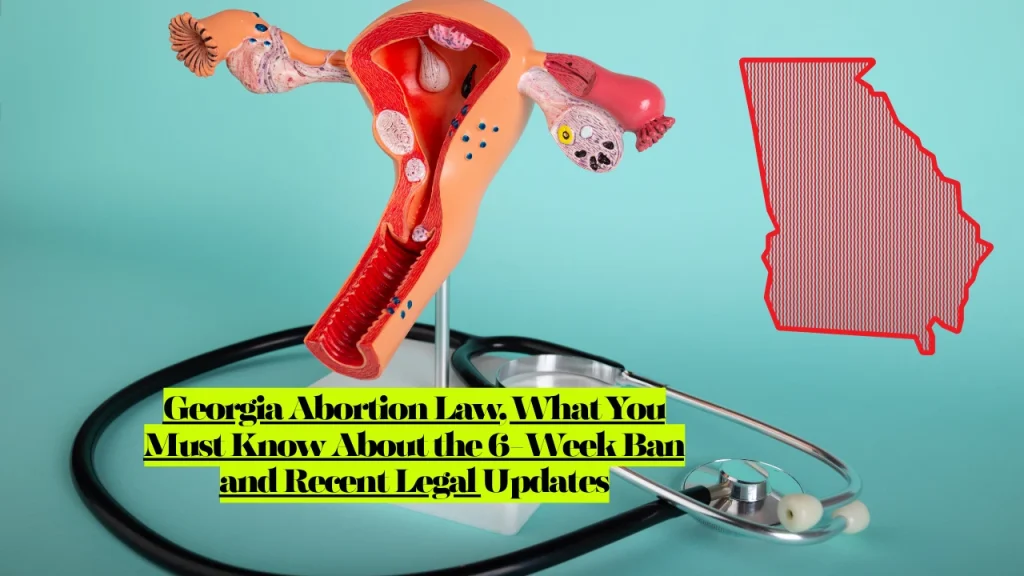Is Abortion Legal in Georgia? What You Must Know About the 6-Week Ban and Recent Legal Update
Is Abortion Legal in Georgia?
Abortion in Georgia is currently restricted after detection of fetal cardiac activity, typically at six weeks of pregnancy—before many people know they’re pregnant. The ban remains in effect while ongoing legal challenges work through Georgia’s Supreme Court following a February 2025 ruling that vacated a lower court decision declaring the law unconstitutional. The six-week restriction, known as the LIFE Act, took effect in July 2022 after the U.S. Supreme Court overturned Roe v. Wade.
High-profile cases involving Georgia women whose deaths have been attributed to the state’s abortion ban—including Amber Nicole Thurman, Candi Miller, and Adriana Smith—have placed national attention on the law’s real-world impact.
What Are Georgia’s Current Abortion Restrictions?
The Six-Week Cardiac Activity Ban
Georgia law prohibits abortion once a detectable human heartbeat exists, defined as embryonic or fetal cardiac activity within the gestational sac. Most pregnant individuals discover pregnancy around 5.5 weeks after their last menstrual period, leaving an extremely narrow window for abortion access.
The law requires physicians to perform an ultrasound to detect cardiac activity before proceeding with any abortion. If detected, abortion becomes illegal except under specific exceptions.
Mandatory Waiting Periods and Counseling
Georgia requires a 24-hour waiting period between the initial appointment and the actual abortion procedure. During this time, patients must receive state-mandated counseling materials covering fetal development, abortion procedures, and potential risks.
Recent Changes to Georgia Abortion Law in 2025
Supreme Court Ruling Reinstates the Ban
In February 2025, the Georgia Supreme Court vacated a September 2024 district court ruling that had temporarily blocked the six-week ban. The lower court had found the law violated Georgia’s constitutional right to privacy, but the Supreme Court ordered reconsideration based on new standing requirements.
A January 2025 precedent in Wasserman v. Franklin County now prevents third-party organizations like SisterSong from filing lawsuits on behalf of patients, significantly limiting legal challenges to abortion restrictions.
Legislative Attempts at Total Ban
In March 2025, House Bill 441 received a hearing proposing to completely ban and criminalize abortion in Georgia with no exceptions for rape or incest. The bill received no vote and faces opposition from moderate Republicans, including House Public and Community Health Committee Chair Sharon Cooper, who stated Georgia has “gone as far as we should go on that issue.”
Related article: Is Abortion Legal in Arizona? What You Need to Know About the State’s New Constitutional Protection (2025)

High-Profile Cases Drive Debate
In May 2025, 30-year-old Adriana Smith became brain-dead while nine weeks pregnant, and Emory University Hospital kept her on life support, citing Georgia’s abortion ban as justification. Georgia Attorney General Chris Carr’s office responded that “there is nothing in the LIFE Act that requires medical professionals to keep a woman on life support after brain death,” highlighting confusion about the law’s application.
What Are the Exceptions to Georgia’s Abortion Ban?
Medical Emergencies
Abortion is permitted when a physician determines that continuing the pregnancy would cause the death of the pregnant woman or substantial and irreversible physical impairment of a major bodily function. Mental or emotional health conditions do not qualify as medical emergencies under Georgia law.
The Georgia Department of Public Health clarified in September 2024 that physicians providing life-saving treatment for pregnant women do not violate Georgia law, and failure to provide such treatment may constitute malpractice.
Rape and Incest Cases
Abortion is allowed up to 20 weeks gestation for pregnancies resulting from rape or incest, but only if an official police report has been filed alleging the offense.
This exception creates significant barriers:
- Reporting requirement: Many survivors never file police reports due to trauma, fear, or distrust of law enforcement
- Time constraints: The 20-week limit may not provide adequate time for survivors to process trauma and make decisions
- Proof burden: Survivors must navigate the criminal justice system while dealing with pregnancy
Medically Futile Pregnancies
Georgia law allows abortion when a physician determines in reasonable medical judgment that the pregnancy is medically futile—meaning the fetus has profound congenital or chromosomal anomalies incompatible with sustaining life.
Where Can Georgia Residents Access Abortion Services?
In-State Abortion Clinics
Currently, 13 abortion clinics in Georgia offer in-person services, though all must comply with the six-week restriction. Major providers include:
- Atlanta Comprehensive Wellness Clinic
- Carafem Health Center
- Feminist Women’s Health Center
- Summit Medical Associates
All Georgia clinics can only provide abortion services before six weeks or under qualifying exceptions.

Out-of-State Options
North Carolina is the only place in the Southeast where residents can access legal abortion after six weeks gestation, with restrictions beginning at 12 weeks.
Neighboring states’ abortion laws:
- Florida: Six-week ban enacted May 1, 2024, essentially eliminating Florida as an access point for Southern residents.
- South Carolina: Six-week restriction with exceptions for rape, incest, and health.
- Tennessee: Total abortion ban with no exceptions for rape or incest, only life-threatening emergencies.
- Alabama: Total abortion ban with exceptions only for serious health risks, no rape or incest exceptions.
- North Carolina: Legal until viability (24-28 weeks) with exceptions for health risks.
Following Florida’s six-week ban, average travel time for abortion access in Southern states increased by 300%, with residents now driving an average of 2 hours and 12 minutes one-way.
Financial Assistance Resources
Access Reproductive Care-Southeast (ARC-Southeast)
- Toll-free: 1-855-227-2475
- Provides financial assistance for abortion care
- Covers residents in GA, TN, MS, SC, and FL
Additional Support Organizations:
- National Abortion Federation Hotline
- Repro Legal Helpline: 1-844-868-2812 (free, confidential legal information)
- All-Options Hotline (counseling and information)
How Does Georgia Compare to Other States?
Georgia is one of six states with total bans occurring before or at the end of the first trimester, alongside Florida, Iowa, Nebraska, North Carolina, and South Carolina.
Key differences:
- More restrictive than Georgia: 12 states have total abortion bans with few or no exceptions
- Less restrictive than Georgia: Nine states and Washington D.C. have no gestational restrictions
- Similar to Georgia: Six other states enforce bans between 6-12 weeks
Georgia residents experienced a 523% increase in average travel time for abortion access—an additional 3 hours and 24 minutes—compared to pre-Dobbs conditions.
Legal Challenges and Future Outlook
Ongoing Litigation
The SisterSong v. State of Georgia case continues at the district court level after the Supreme Court’s remand, but plaintiffs face significant hurdles due to standing requirements that prevent third-party advocacy organizations from suing on behalf of patients.
Enforcement and Penalties
Physicians who perform illegal abortions face criminal penalties including prison time. However, Georgia law does not penalize women who receive abortions.
Several district attorneys in metro Atlanta counties—including DeKalb, Fulton, Gwinnett, Douglas, Clarke, and Oconee—have pledged not to prosecute women and doctors involved with abortion procedures, covering nearly one-third of Georgia’s population.
Provider Concerns
Mary Ziegler, a law professor at UC-Davis, notes that medical providers in states with restrictive abortion laws have become risk-averse, creating scenarios where attorney general guidance conflicts with how doctors and their lawyers interpret the law.
FAQ: Georgia Abortion Laws
Can I get an abortion in Georgia in 2025?
Yes, but only before six weeks of pregnancy (measured from your last menstrual period) or if you qualify for an exception. Exceptions include medical emergencies to prevent death or substantial physical impairment, rape or incest with a police report filed (up to 20 weeks), and medically futile pregnancies.
What is the gestational limit for abortion in Georgia?
Six weeks after the last menstrual period, or when cardiac activity is detected—typically around five to six weeks of pregnancy. This is approximately two weeks after a missed period.
Are there exceptions for health reasons?
Yes, if a physician determines abortion is necessary to prevent the pregnant person’s death or substantial and irreversible physical impairment of a major bodily function. Mental health conditions do not qualify.
Do I need a police report for rape or incest exceptions?
Yes, Georgia law requires “an official police report has been filed alleging the offense of rape or incest” to access abortion up to 20 weeks gestation.
Can I get abortion pills by mail in Georgia?
Shield laws in some states allow clinicians to provide telehealth abortion services to Georgia residents, though this operates in a legal gray area. Consult the Repro Legal Helpline at 1-844-868-2812 for confidential legal information about your specific situation.
How much does an abortion cost in Georgia?
Costs vary by provider and gestational age, typically ranging from $400-$800 for medication abortion and $500-$1,500 for surgical abortion. Contact ARC-Southeast at 1-855-227-2475 for financial assistance.
Can minors get abortions in Georgia without parental consent?
Georgia law requires minors to obtain parental consent or seek judicial bypass through the court system, adding additional barriers for young people seeking abortion care.
Related Articles
- What Can Be Used Against You in Child Custody Cases
- Kentucky Judge Dismisses Jewish Mother’s Lawsuit Against State Abortion Ban
- Family Law Attorney Payment Plan Options
Disclaimer: This information is for educational purposes only and does not constitute legal advice. Abortion laws in Georgia are subject to ongoing legal challenges and may change. For personalized legal guidance about your specific situation, consult an attorney specializing in reproductive law or healthcare law. For immediate, confidential legal information, contact the Repro Legal Helpline at 1-844-868-2812.
Last Updated: October 30, 2025
About the Author

Sarah Klein, JD, is a former family law attorney with over a decade of courtroom and mediation experience. She has represented clients in divorce, custody cases, adoption, Alimony, and domestic violence cases across multiple U.S. jurisdictions.
At All About Lawyer, Sarah now uses her deep legal background to create easy-to-understand guides that help families navigate the legal system with clarity and confidence.
Every article is based on her real-world legal experience and reviewed to reflect current laws.
Read more about Sarah
